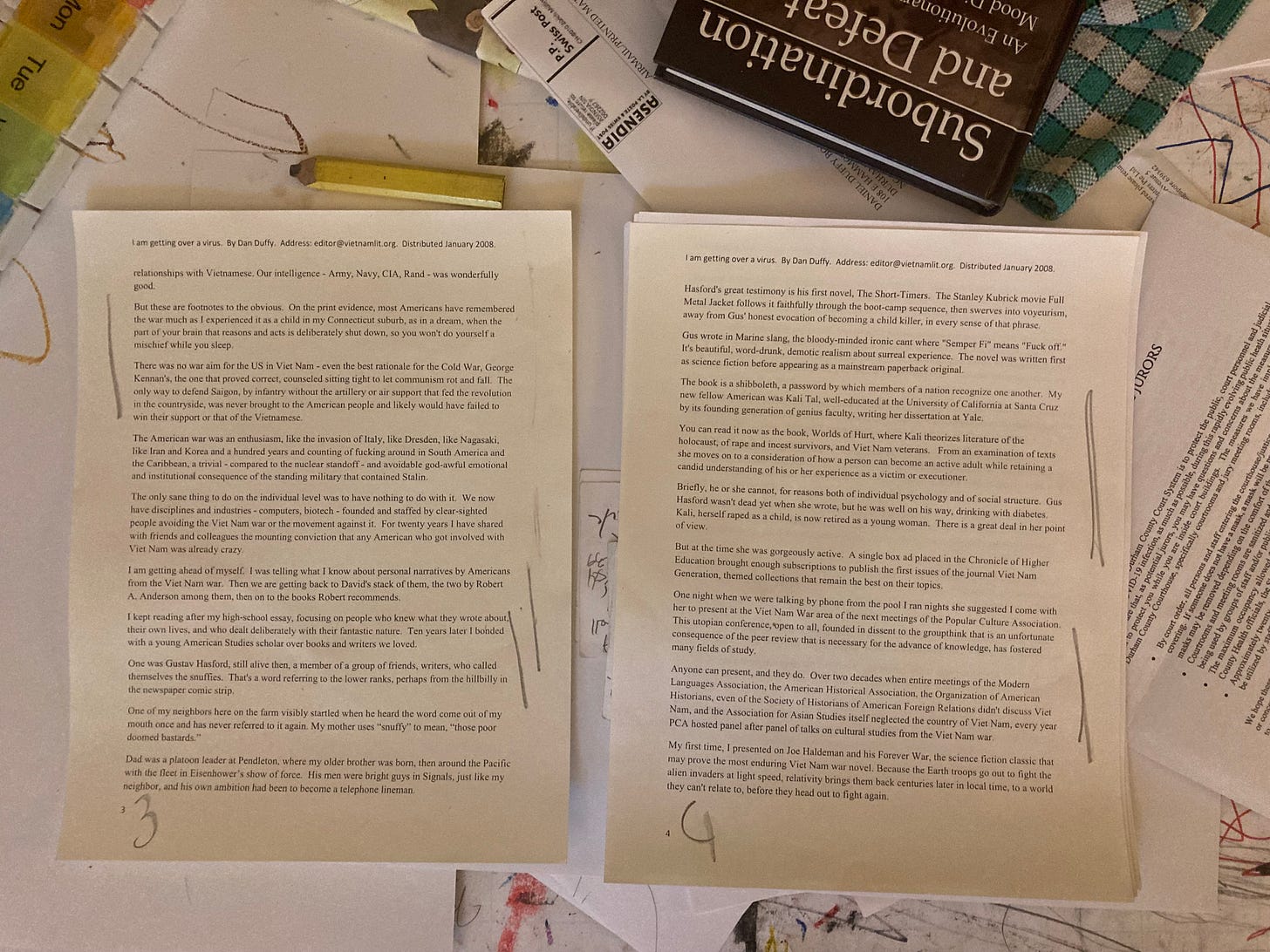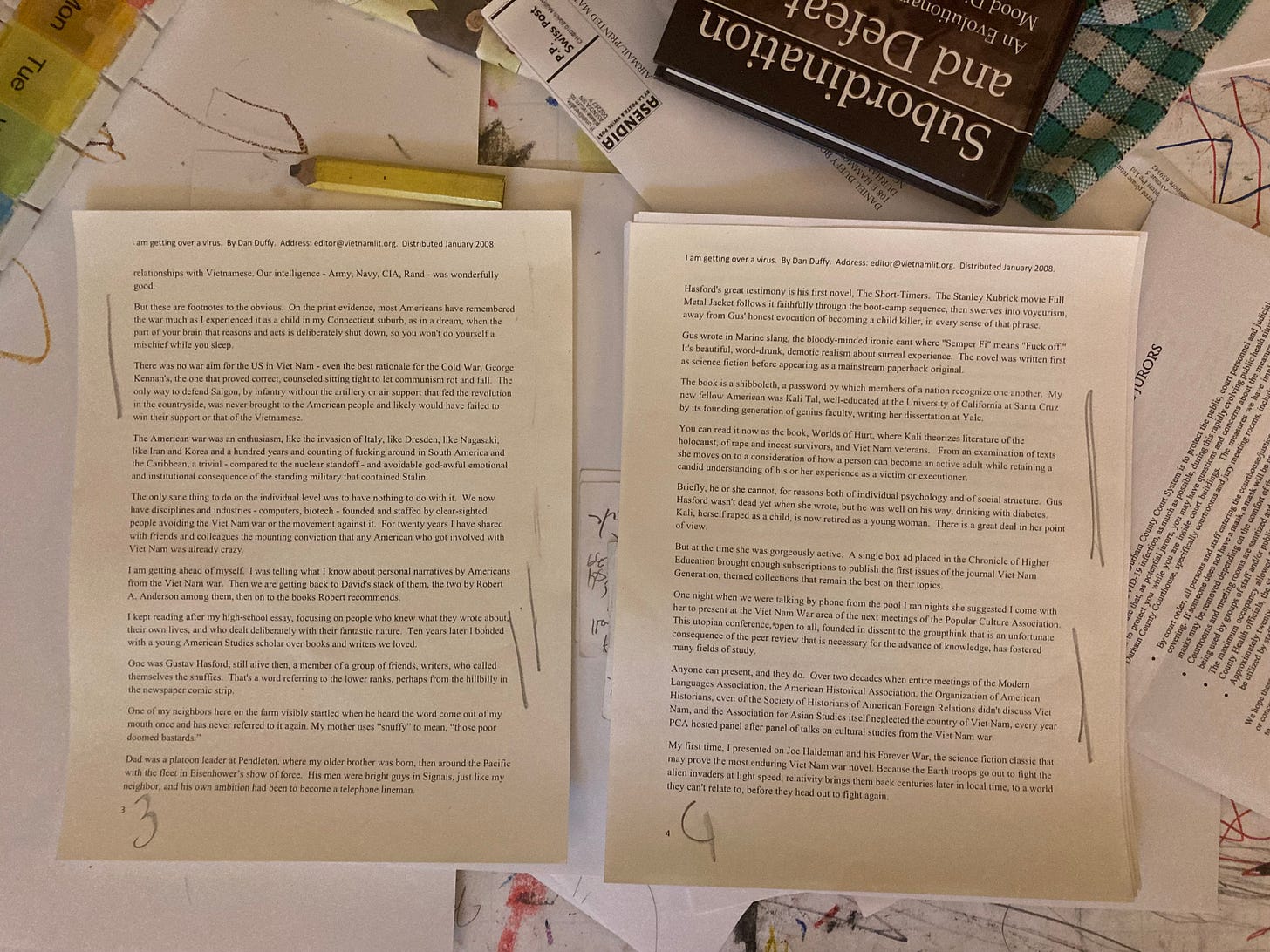I am still reading my convalescent essay from 15 years ago while I rest. That young man told quite a tale.
I kept reading after my high-school essay, focusing on people who knew what they wrote about, their own lives, and who dealt deliberately with their fantastic nature. Ten years later I bonded with a young American Studies scholar over books and writers we loved.
One was Gustav Hasford, still alive then, a member of a group of friends, writers, who called themselves the snuffies. That's a word referring to the lower ranks, perhaps from the hillbilly in the newspaper comic strip.
One of my neighbors here on the farm visibly startled when he heard the word come out of my mouth once and has never referred to it again. My mother uses “snuffy” to mean, “those poor doomed bastards.”
Dad was a platoon leader at Pendleton, where my older brother was born, then around the Pacific with the fleet in Eisenhower’s show of force. His men were bright guys in Signals, just like my neighbor, and his own ambition had been to become a telephone lineman.
Hasford's great testimony is his first novel, The Short-Timers. The Stanley Kubrick movie Full Metal Jacket follows it faithfully through the boot-camp sequence, then swerves into voyeurism, away from Gus' honest evocation of becoming a child killer, in every sense of that phrase.
Gus wrote in Marine slang, the bloody-minded ironic cant where "Semper Fi" means "Fuck off." It's beautiful, word-drunk, demotic realism about surreal experience. The novel was written first as science fiction before appearing as a mainstream paperback original.
The book is a shibboleth, a password by which members of a nation recognize one another. My new fellow American was Kali Tal, well-educated at the University of California at Santa Cruz by its founding generation of genius faculty, writing her dissertation at Yale.
You can read it now as the book, Worlds of Hurt, where Kali theorizes literature of the holocaust, of rape and incest survivors, and Viet Nam veterans. From an examination of texts she moves on to a consideration of how a person can become an active adult while retaining a candid understanding of his or her experience as a victim or executioner.
Briefly, he or she cannot, for reasons both of individual psychology and of social structure. Gus Hasford wasn't dead yet when she wrote, but he was well on his way, drinking with diabetes. Kali, herself raped as a child, is now retired as a young woman. There is a great deal in her point of view.
One night when we were talking by phone from the pool I ran nights she suggested I come with her to present at the Viet Nam War area of the next meetings of the Popular Culture Association. This utopian conference, open to all, founded in dissent to the groupthink that is an unfortunate consequence of the peer review that is necessary for the advance of knowledge, has fostered many fields of study.
Anyone can present, and they do. Over two decades when entire meetings of the Modern Languages Association, the American Historical Association, the Organization of American Historians, even of the Society of Historians of American Foreign Relations didn't discuss Viet Nam, and the Association for Asian Studies itself neglected the country of Viet Nam, every year PCA hosted panel after panel of talks on cultural studies from the Viet Nam war.
My first time, I presented on Joe Haldeman and his Forever War, the science fiction classic that may prove the most enduring Viet Nam war novel. Because the Earth troops go out to fight the alien invaders at light speed, relativity brings them back centuries later in local time, to a world they can't relate to, before they head out to fight again.
Bruce Franklin hadn't written about Forever War yet, but I met great friends who would already know about anything I discussed, the bibliographers David Willson and John Baky. Veterans, as many librarians are, they were building monuments of scholarship.
At his Lasalle University collection, Imaginative Representations of the Viet Nam War, John has a continuing project to gather print and realia remembering the war as it comes out. David, while teaching at Green River Community College, was looting warehouses of old porn to show how writers had represented the war as it was going on, before the post-war amnesia which we all were working to correct.
David as well was writing his series of REMF (Rear Echelon Mother Fucker) novels, beloved of the vet writers, with their sly focus on the support troops who constituted the vast majority of US personnel in Viet Nam. Hooked, I started writing a newsletter for Viet Nam Generation.
I recruited David and another speaker, the scholar of French and Special Forces sergeant major, Alan Farrell, to contribute regularly. My newsletter became the journal, and Kali's anthologies became books. Toward the end we put it all on the beginnings of the Web, where you can still search and read the articles.
PCA was our big event every year. I had time to go because I was odd-jobbing, lifeguarding, cutting down trees, assembling anthologies and teacher's guides for publishers, writing US business studies for third-world entrepreneurs. I was taking care of myself and pursuing my interests.
A born scholar, I find it impossible to make the difficult accommodations we all must make to thrive at an institution. My cousin David's father ran up 60 patents for General Electric and my other senior uncle ran department after department in the humanities for Brandeis, the college he helped to establish, but the rest of us are self-employed or hobbyists.
It’s all true. When I have rested up I will have a go at how mistaken I remained.
Portrait at All People Soul Food Grill, Hillsborough, North Carolina, © 2007 by Tim Duffy. Link to the essay “I am getting over a virus” here. The first and second Viet Nam letter on “I am getting over a virus” appeared on February 7 and February 10. The fourth and fifth appeared on February 16 and February 19, 2024.








Pure Gold. I look forward to hearing your present self explain why you were mistaken 15 years ago, but this helps me understand how you've successfully flown over the cuckoo's nest of institutions. Your Viet Nam scholarship enabled me to recognize that the China Poobahs I was expected to genuflect to (many promoted from Viet Nam to China policy) were in fact chowderhead/stuffed-shirt/know-nothings. Ironic that my early 20s patron was none other than Winston Lord, the one Henry aide who didn't quit over bombing Cambodia. I was unusually [for a 21-year-old] knowledgeable about that history as a result of knowing you and your family. Sorry if I sound like a fanboy, from my perspective I'm just citing my sources.